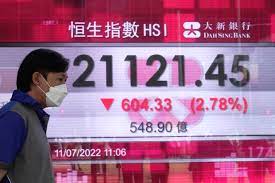Tokyo, July 11:Asian shares were mostly lower on Monday, although Japan’s benchmark rallied, welcoming a landslide parliamentary election victory by the ruling Liberal Democratic Party.
Concerns about global inflation and interruptions to economic activity brought on by the coronavirus pandemic are adversely affecting investor sentiment.
The tide may be shifting as more and more market players focus on the economic outlook, Stephen Innes of SPI Asset Management said in a commentary.
“A recession is not the market’s base outlook, but until proven otherwise, investors will debate the depth of the growth hit, not the likelihood of recession; thus, good economic data is good news for stocks,” he said.
Japan’s benchmark Nikkei jumped 1.1 per cent in morning trading to 26,803.30.
Japan’s governing party and its coalition partner scored a major victory in balloting Sunday, which came two days after the assassination of former Prime Minister Shinzo Abe. Abe was shot by a man emerging from the crowd listening to his campaign speech, took out a homemade gun and fired.
The attack shocked a nation that rarely sees gun violence. The Liberal Democratic Party was bound for victory even before the assassination, but some analysts said the shock of Abe’s death was likely to strengthen that trend.
With its partner Komeito party, the ruling coalition raised its combined share in the 248-seat upper house to 146. Prime Minister Fumio Kishida almost certainly stands to rule without interruption until a scheduled election in 2025, ensuring that the pro-US defense and diplomatic policies of the late Abe and the Liberal Democrats will continue unchanged.
Australia’s S&P/ASX 200 declined 0.6 per cent to 6,638.20. South Korea’s Kospi lost 0.3 per cent to 2,342.82.
Hong Kong’s Hang Seng slipped 2.7 per cent to 21,144.53, while the Shanghai Composite fell 1.5 per cent to 3,307.23. Technology shares fell after market regulators in China fined companies for not reporting past transactions as required.
Wall Street had a sputtering finish last week, as global markets turned their attention to Chinese economic indicators and moves by central banks, including the US Federal Reserve, to contain stubbornly growing inflation.
The hotter the US economy remains, the more likely the Federal Reserve is to continue raising interest rates.
A strong hiring report for June assuaged fears that the US economy might be on the cusp of a recession — and highlighted the resilience of the nation’s job market.
Yet the figures the government released Friday also spotlighted the sharp divide between the healthy labor market and the rest of the economy: Inflation has soared to 40-year highs, consumers are increasingly gloomy, home sales and manufacturing are weakening and the economy might actually have shrunk for the past six months.
The Fed has already hiked its key overnight interest rate three times this year, and the increases have become increasingly aggressive. Last month it raised rates by the sharpest degree since 1994, by three-quarters of a percentage point to a range of 1.50 per cent to 1.75 per cent. It was at virtually zero as recently as March.
Other central banks around the world are also raising interest rates and removing emergency plans put in place early in the pandemic to prop up financial markets.
On Friday, the S&P 500 dropped 0.1 per cent to 3,899.38, snapping a four-day winning streak. The Dow fell 0.1 per cent to 31,388.15, while the Nasdaq rose 0.1 per cent to 11,635.31. The Russell 2000 index of small company stocks slipped less than 0.1 per cent, to 1,769.36.
In energy trading, US benchmark crude lost 79 cents to USD 104.00 a barrel. It gained USD 2.06 to USD 104.79 a barrel on Friday.
Brent crude, the international standard, fell 74 cents to USD 106.28 a barrel.
In currency trading, the US dollar gained to 137.03 Japanese yen from 136.10 yen. The euro cost USD 1.0148, down from USD 1.0182. (AP)
Trending Now
E-Paper


